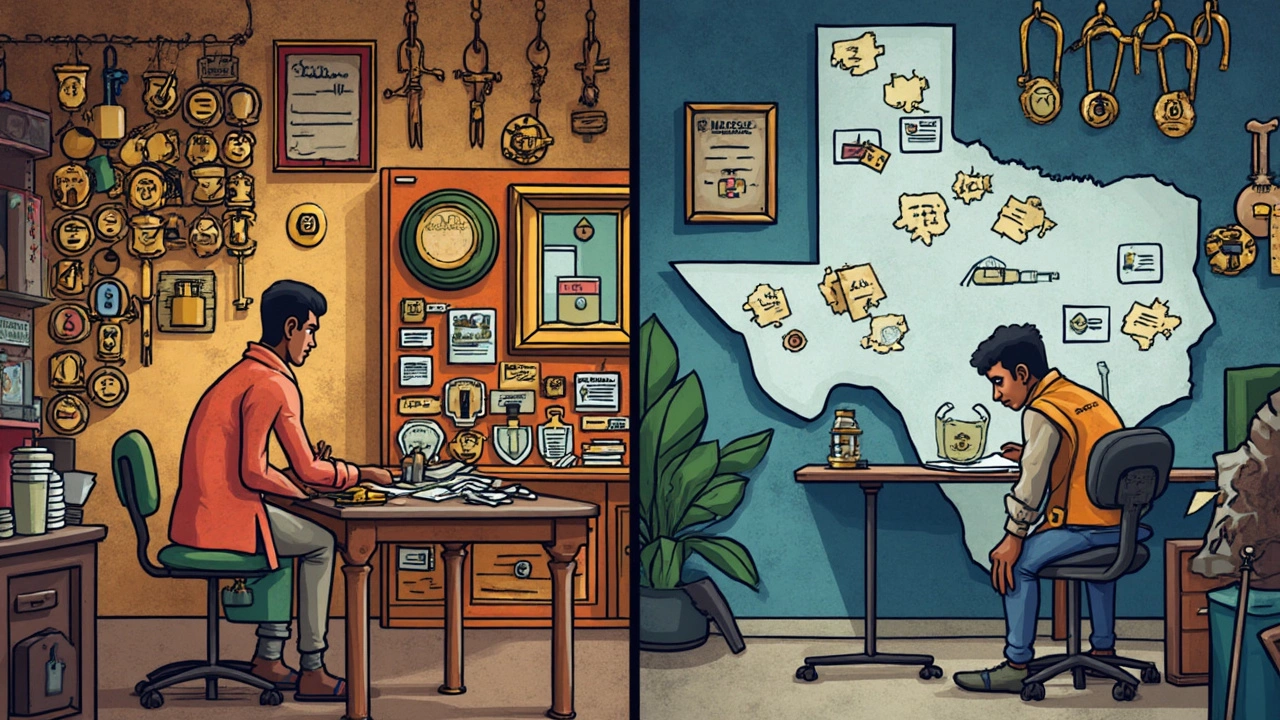
If you're thinking about working as a locksmith in Texas, it's not as simple as grabbing a set of lock picks and starting work. Texas has strict rules on who can legally call themselves a locksmith. No surprise here—a license is required for almost all locksmith jobs in this state. That means you can't just set up shop without doing some paperwork first.
This isn't just a random rule to make things harder. The Texas Department of Public Safety takes locksmith work seriously because you're dealing with people's safety. So if you’re caught working without the right license, you could end up with a heavy fine or even face criminal charges.
Wondering if there are any shortcuts or exceptions? There are a few, but they're pretty specific and don’t cover the average person just learning the trade. So before you buy your first set of tools, make sure you're looking at the right training and steps for licensing. If you're reading this from India and comparing, the rules in Texas might surprise you with how strict they are!
- Texas Locksmith Licensing: The Basics
- What Counts as Locksmith Work?
- Training and Learning Paths
- Consequences of Skipping the License
- India vs Texas: What Can You Learn?
Texas Locksmith Licensing: The Basics
Getting started as a locksmith in Texas comes with a long list of rules. Here’s the first thing you need to know: it’s illegal to work as a locksmith in Texas without a license. It doesn’t matter if you’re just making keys for friends or running a full shop—the rules fit almost everyone.
The Texas Department of Public Safety (DPS) runs the licensing process through its Private Security Bureau. To snag a locksmith license, you have to:
- Be at least 18 years old
- Pass a criminal background check
- Get fingerprinted
- Fill out the application and pay the fees
- Complete required training if you’re running your own business
The main fee for an individual locksmith license is $37 (as of 2025). It’s not a wallet-buster, but it’s also not a one-and-done deal. Licenses need to be renewed every year to keep things official. For those looking to run a locksmith company, there are extra hoops to jump through, including insurance and business registration.
Check out these quick details from the Texas locksmith license process so you have the important stuff in front of you:
| Requirement | Details |
|---|---|
| Minimum Age | 18 |
| Background Check | Yes (criminal history review) |
| Fingerprinting | Mandatory |
| Application Fee (Individual) | $37 (2025 figure) |
| License Renewal | Every 1 year |
| Training | Depends (required for owners/operators) |
Why are Texas laws so tight? Being a locksmith means handling keys, locks, and sometimes even high-security business systems. The state is just making sure only trusted folks handle important stuff like this. So if you want to get into the trade, step one is sorting out your paperwork before you ever even touch a door lock for a customer.
What Counts as Locksmith Work?
Believe it or not, you can’t just fix a lock for your neighbor and call yourself a locksmith in Texas. The state spells out exactly what falls under the “locksmith work” label. It’s way more than just unlocking a door if someone loses their keys.
Here’s what the Texas law actually covers:
- Cutting and making keys, whether it’s for a house, car, or even a safe.
- Installing, repairing, or changing any type of mechanical or electronic lock—including smart locks.
- Opening locks if someone is locked out, whether that's a car, home, or business.
- Rekeying locks—basically changing how a lock works so a new key fits.
- Fixing or installing door hardware that’s connected to locking mechanisms, like deadbolts or high-security padlocks.
All these jobs count as real locksmith work under Texas law, so you can’t legally do them without the right paperwork. Even replacing simple electronic key fobs or smart home locks falls under these rules.
To show you how broad this really is, check out this quick breakdown:
| Service | License Required? |
|---|---|
| Making keys for a house | Yes |
| Programming a car key fob | Yes |
| Installing a smart door lock | Yes |
| Fixing a broken deadbolt | Yes |
| Changing a lock pin system | Yes |
There’s one big thing to remember: you don’t have to be working for a company for these rules to kick in. Even if you call yourself “just a freelancer” or you’re helping out a friend, you still need a locksmith license Texas before you touch anyone’s lock for pay.
If you stick to your own property, that’s different. The law mainly kicks in when you offer these services to someone else, especially if money is involved. Stay on the safe side—don’t risk getting labeled as an unlicensed locksmith just because the work sounds simple.

Training and Learning Paths
Getting started as a locksmith in Texas isn’t just about picking up a few tricks on YouTube. To become a proper locksmith—and get your official locksmith license Texas—you have to follow a certain path. Texas law says you need to go through an approved training program. This usually means enrolling in courses from a tech school or locksmith association that the state recognizes. These programs cover everything from basic lock installation to the ins and outs of modern security systems.
Here’s what most training paths look like:
- Enroll in a recognized locksmith training course. These are often offered at community colleges or through industry organizations. Make sure the course is approved by the Texas Department of Public Safety.
- Complete hands-on learning. Expect plenty of practical exercises. You’ll be working with tools, locks, car entry systems, and often even get a chance to shadow an experienced locksmith on real jobs.
- Study Texas state laws. You’ll need to understand security laws and business codes just as much as how to unlock a stubborn door.
- Pass a background check. Texas wants to be sure only trustworthy folks work as locksmiths, so anyone applying for a license must go through a criminal history review.
- Apply for your locksmith license. After training, you fill out your paperwork with the Texas Department of Public Safety. There’s a fee, and you’ll need fingerprints for your background check.
If you’re wondering about DIY learning or online shortcuts, forget it—Texas checks credentials before you get licensed. And if you’re in India, know that the steps there might be more relaxed, with shorter courses and less government paperwork. In Texas, though, investing in a proper training program is a must. It’s the only way to work legally—and be taken seriously by customers or employers.
Consequences of Skipping the License
Thinking about working as a locksmith in Texas without a license? It’s risky. Texas law is clear on this: locksmiths must be licensed, and getting caught without one can hit hard. The Texas Department of Public Safety (DPS) is the body that checks these things. They don’t just look the other way if someone’s operating under the radar—they hand out fines or worse.
The penalties aren’t pocket change either. If you work as an unlicensed locksmith in Texas, you could get a civil penalty starting at $1,000 for each day you’re caught working without a license. Do that for a week, and you’re looking at $7,000—just like that. For repeated violations, things get even messier, including possible jail time.
If you get charged, it’s usually a Class B misdemeanor at minimum. But if you make this a habit, authorities can bump the charges up. This can stay on your record and ruin your chances of legally working as a locksmith in the future. Customers can even sue for damages if anything goes wrong while you’re working unlicensed.
“Unlicensed locksmith activity is a direct threat to public safety, and the DPS investigates every complaint seriously.”
– Texas Department of Public Safety Spokesperson
It’s not just the DPS who’s watching. A lot of customers now actually check for licenses online before they even call a locksmith. Insurance companies in Texas might also refuse to cover damages or losses if you don’t have the right license.
| Violation | Penalty |
|---|---|
| First offense (unlicensed work) | $1,000+ per day |
| Repeat offense | Higher fines, criminal charges |
| Fraud or fake license | Jail time, permanent ban |
Skipping the license isn’t just a small mistake—it can end your locksmith career fast. If you want to work as a locksmith license Texas holder, do it right from day one. Better safe than sorry.

India vs Texas: What Can You Learn?
Ever wondered how things work in India compared to Texas when it comes to locksmiths? The difference is bigger than most people expect. In India, unless you’re working for big companies or government projects, there’s no national law saying you must get a license to be a locksmith. Most people just learn by working with someone else, maybe in a family shop or as an assistant. You can buy tools and start learning straight away. There might be some local rules, but nothing close to what you’ll find in the US.
Now compare that to locksmith license Texas rules. Texas says you cannot start locksmith work without a state license. To get this license, you need a background check, fingerprinting, and often, you must pass a criminal history review. Plus, you pay fees and renew your license every two years, which keeps you under the state’s radar. Texas even has rules for apprentice locksmiths—they need a registration too, so everyone is tracked from day one.
If you’re training in India and thinking about the US, especially Texas, these are a few things you should keep in mind:
- Learning style is different. In India, hands-on practice is often enough. In Texas, you’ll need paperwork, background checks, and sometimes a formal course.
- Rules are strict. Texas does random inspections and undercover checks. If you don’t follow the rules, you risk your career right away.
- Client trust matters. In Texas, people look for licensed locksmiths because it’s about home and business security. Listing your license number is a must when advertising.
- Career upgrades. Because of government regulation, a Texas locksmith license can make you look more serious and skilled if you ever come back to India or go anywhere else.
If you want to work internationally or with multinational clients, learning about licensing and getting certified can really boost your profile. Even if you don’t need a license in India, it’s smart to keep proper records and maybe take a reputable training course. It’s only a matter of time before more Indian cities tighten up the rules—and you’ll be ready if that happens.
